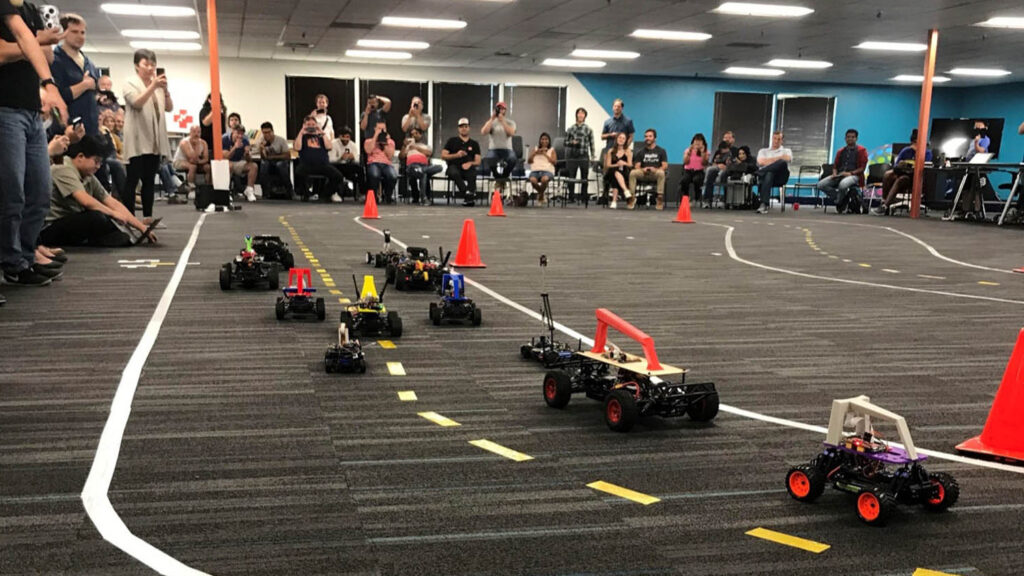The importance of fun and play in skills development is often underestimated, but it can be an important gateway to career progression. Don’t feel guilty about your playtime – feel upgraded, says our columnist, Erin McDermott
Are you up for some playtime? Or do you think you have too many serious adult career things to do? What if I told you playtime IS a thing that responsible grown-ups should do? Lately, I was confronted with several situations that prove how true this is.
During Nvidia’s GTC 21 conference, I attended a session discussing the development involved in a particular autonomous drone race. Was it cool? Yes. Was it play? Yes! The winning team was grinning in a way I’ve not seen sober engineers emote before. Was it being watched like a hawk by recruiters and corporate leaders?
You bet! It reminded me of an event I attended years ago, a DIY robocars race in Silicon Valley. These races were like the autonomous drone competitions, but with homemade (toy) cars. A local coworking space, Circuit Launch, was packed with several hundred giddy nerds. We sympathetically groaned in unison when a collision occurred on the track. Other times, we cheered for those cars that finished the race. But there was more going on.
One attendee told me large corporations take a keen interest in these competitions. Even tech giants developing autonomous driving technology have a hard time finding engineers to poach who have many years of experience in this stuff. After all, which company would they steal them from? This application is only being developed right now, for the first time!
My acquaintance also told me that although the progress in these fun races may seem limited, many of the techniques and algorithms developed will provide foundations for methods used in full-sized autonomous vehicles. These tinkerers may be having fun – but to others, what they do could deliver significant new advances.
Every day’s a school day
The same week that I watched the autonomous drone presentation, I was invited to weigh in on a high school mechatronics curriculum. It was for a class taught by Jim ‘The STEAM Clown’ Burnam, the most badass mechatronics teacher on the planet. His kids leave with hands-on experience in applied physics, electronics development, programming, and most importantly, in building fire-breathing robots (depending on the year).
I was going to suggest incorporating AI if at all possible in Jim’s jam-packed curriculum. As it turns out, he already has plans to do just that.
The implications here are worth stopping to think about. Of course having experience in a thing is a great asset when trying to get a job doing that thing. Even better is having a real-world example of something you built to demonstrate your abilities.
What’s more, Jim’s students leave with practical experience in an emerging technology where they must make intellectual leaps. That means some of these teenagers will actually be more knowledgeable than seasoned hardware engineers who have never had a job in autonomous widgets.
Build skills through play
While these examples involve emerging technologies, play is important in all types of skill development. In fact, I was recently shocked to discover how much of an advantage play can bring!
A big time-suck for me these days is editing promotional videos, so I was looking to outsource the work. I didn’t have high expectations for production quality. After all, most of my digital art and video editing experience I picked up for fun when I went on sabbatical years ago.
Back then, I was considering a career change, so I experimented with artistic tools. In the years that passed, I actually got paid to produce videos, but never considered myself a cinematographer. It still seemed like play.
So, in my search for a video editor, I primarily cared that they could highlight the relevant and not-boring parts. Editors tried to woo me with their years of experience and their fancy degrees. I replied with, “OK, but can you pick out great clips?”
Some of them flat-out told me “No.” Others auditioned with clips I paid them to create. Most of those were worthless and were thrown away.
I tried to compliment these editors about the good things their fancy degrees enabled them to do robotically, but I also had to tell them: “So, this clip you picked. He said literally nothing in that clip. And, also, it was hard to watch the entire 60 seconds.”
I was genuinely taken aback that my years of fooling around making videos gave me more competence than degree-holding filmmakers could offer.
For these reasons, if your spouse complains that you spend too much time in the garage attempting to 3D print with strange or perhaps alarming materials, tell him or her that it’s career development!
If you help your child with a technical school project, and put a little extra engineering pizazz into that thing, be sure to document your work and take photos. You’ll want those for your professional portfolio.
And if you’re having fun tinkering with a new skill – don’t feel guilty, feel upgraded!
Get in touch: Erin M. McDermott directs optical engineering at Spire Starter, helping hardware engineers who don’t know that things using light (cameras, LED illumination, laser processes and so on) need competent design, optimisation and tolerancing like the rest of their widget.
She also runs OddEngineer.com, connecting manufacturers and startups with niche hardware engineering experts. Get in touch at spirestarter.com or @erinmmcdermott






